I spent all weekend at the Decatur Book Festival, reputed to be the largest independent book fest in the country. In its sixth year, the festival is now attended by more than 70,000 people who get the opportunity to hear 300 authors speak. Begun by Daren Wang and Tom Bell in 2005, this is my second season experiencing the phenomenon of strolling around blocked off Decatur streets to see all manner of reading material, listen to authors, Â meet up and coming poets and imbibe in some fine Irish ale and curried chips. Who knew that Atlanta was so literarily inclined?

I stopped in at the booths of  small publishers like the Georgia Review, and the Chattahoochee Review, who published an early short story by Gina Webb – who now writes for the AJC (see that VIP tag?), just happens to be my dear sister and who accompanied me to the festival on Sunday.
I discovered interesting finds like Dust to Digital, a Grammy award winning Atlanta based company that “combines rare, essential recordings with historic images and detailed texts describing the artists and their works.” One that caught my eye was a wonderful John Fahey 5 CD boxed set, with an 88 page book and photos of Fahey as a youngster, produced in collaboration with Revenant Records.
On Saturday I volunteered with the Decatur Arts Alliance for their small invitational exhibit set up in a local restaurant on the square.
I also had the chance to attend a few author’s readings. First there was Holly Tucker reading from her book Bloodwork, a chilling and fascinating account of the history of blood transfusions. This brief review sums up my response to her talk:
“Holly Tucker does an incredible job of bringing the history of blood transfusion to life with harrowing immediacy, spinning a tale of blood, ambition, and murder so gripping that it reads with novelistic intensity. She also reminds us that science itself has a history, that the discipline which we trust to explain our world can also be bound up in the prejudices and assumptions of our own time. Anyone with a taste for historical intrigue will devour Blood Work, just as I did.â€
Second up on my Saturday schedule was Michael Graetz summarizing his new book The End of Energy, a sobering account of our embattled energy policies over the past forty years. “….since the 1970s, Americans have never been asked to pay a price that reflects the real cost of the energy they consume. Until Americans face the facts about price, our energy incompetence will continue—and along with it the unraveling of our environment, security, and independence.”
James Hansen however, proposes taxing fossil fuels at their source of importation and giving that money back to the American public – as an incentive to build a link to the future with renewable resources. I don’t agree with either of them on nuclear power as much of a viable alternative, but it may be the only way to wean the world off coal. As Graetz said yesterday, coal is a regional and political issue – the cost must be higher so that the customer doesn’t want it.
I finally got to try a King of Pops popsicle. Coconut Lemongrass – refreshing on a hot day, not too sweet. They did a brisk business all weekend long.
In a completely different vein from my Saturday excursions, Atlanta born Tayari Jones’ reading on Sunday from her latest book, Silver Sparrow, was chock full of her bright intellect, highly entertaining and she made the audience crack up. Gina and I agreed that Jones had the best hair and outfit of any author we’d seen. I came away from her talk dying to read her book about a young African-American girl growing up in the South with a bigamist for a father.
I had read her 2009 blog post about applying for a writer’s residency and not getting into one , being put on a waitlist for another and finally getting into this one. I’m in the middle of applying to artists’ residencies and grants, so I had to ask about her experience. She mentioned the need to block out chunks of time to create and that “dropping people out of one’s life” was a necessity. But her sense of humor about these artists’ colonies took over when she began describing the fact that many of the lower tier residencies don’t usually provide meals and were attended mostly by women. Women who loved the idea of being able to eat cereal for dinner if they wanted to – for a whole month – and who were ecstatic to be alone for a change. While the men who arrived at these were not happy that they would have to actually make themselves a sandwich.
In a 2007 post on her blog, she talks about buying a ‘lucky’ sweater in anticipation of getting into Yaddo. When she didn’t get in, she said “that lucky sweater mocked me and all my positive thinking….Flash forward to one year later. The tags were still on the sweater. Arizona was still the third hottest state in the union. I received a letter in the mail. The MacDowell Colony had granted me a winter residency for 2003! I took the sweater with me and when I arrived, I tore the tags off with my teeth.”
She also writes that while she got into The MacDowell Colony for that year, on the next few tries she was denied. Inspiring and proof of my own adage to start at the top and work my way down… and to keep trying.
Mac McGee’s Irish Pub –
These kids knew a thing or three about hula hooping.
Finally, we listened to another author, Katharine Weber, talk about her illustrious family and their escapades in her book The Memory of All That. Weber’s maternal grandmother was not only the first woman to compose the score to a hit Broadway show, but she was also passionately in love with George Gershwin and had a ten year romance with the composer during her marriage to Weber’s grandfather. I’ve been a lover of Gershwin’s music for decades, so this was a real treat for me.
Weber’s humorous recountings of her family’s flaws and eccentricities made the characters alluring and reminded me of the Christopher Walken scene in Woody Allen’s film; someone who could make you squirm as their sibling, but who would definitely never bore. Read the recent NY Times review here.
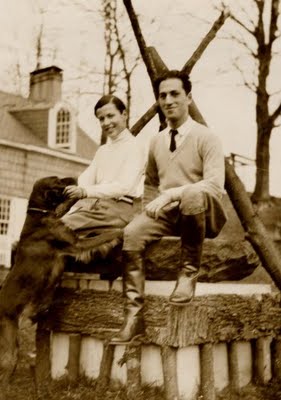
“Their love affair began during Swift’s marriage to James Paul Warburg, the multitalented banker and economist who advised (and feuded with) FDR. Weber creates an intriguing and intimate group portrait of the renowned Warburg family, from her great-great-uncle, the eccentric art historian Aby Warburg, whose madness inspired modern theories of iconography, to her great-grandfather Paul M. Warburg, the architect of the Federal Reserve System whose unheeded warnings about the stock-market crash of 1929 made him ‘the Cassandra of Wall Street.’ “
Weber’s own dad was a hoot.
“A notorious womanizer, Weber’s father was a peripatetic filmmaker who made propaganda and training films for the OSS during World War II before producing the first movie with smells, the regrettable flop that was Aromarama.”
She said that her father, Sidney Kaufman, almost bankrupted the film theatres it was shown in, because the wall coverings, drapes and upholstery had to be torn down, ripped off and completely refurbished.
“He was as much an enigma to his daughter as he was to the FBI, which had him under surveillance for more than forty years, and even noted Katharine’s birth in a memo to J. Edgar Hoover….Colorful, evocative, insightful, and very funny, The Memory of All That is an enthralling look at a tremendously influential—and highly eccentric—family, as well as a consideration of how their stories, with their myriad layers of truth and fiction, have both provoked and influenced one of our most prodigiously gifted writers.”
My sister and I were aware of the synchronicity of our own family’s Hollywood connections; the DeMille, Sam Goldwyn and Chaplin links that would have vanished from the family memory archive, if not for our cousin Judith’s transcribed oral history of her father’s film career that included our own film editor dad’s early years in the industry.
The festival’s official Tee shirts were nicely designed.
I can see why this festival attracts literary lovers from neighboring states – it’s not often that we get to hear about how a writer practices her craft, or her expectations for her readers. One author’s comment that really hit home with me as an artist was hearing how many readers misalign fiction with autobiography, as though the writer’s imaginative creations aren’t as interesting as ‘real life’. As in ‘did that really happen to you?’. And the response should be ‘who cares’.

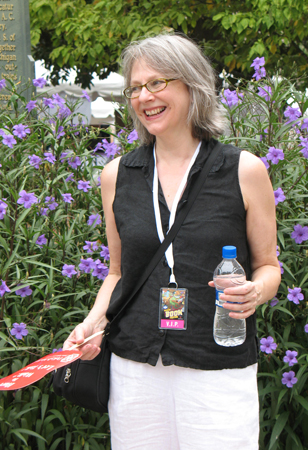
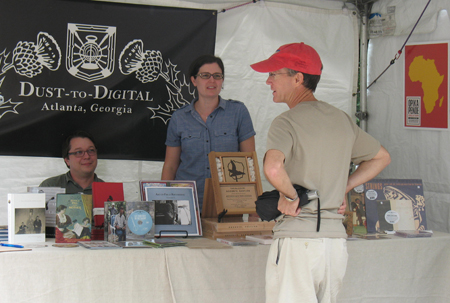
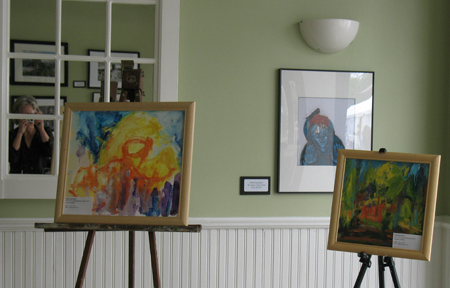
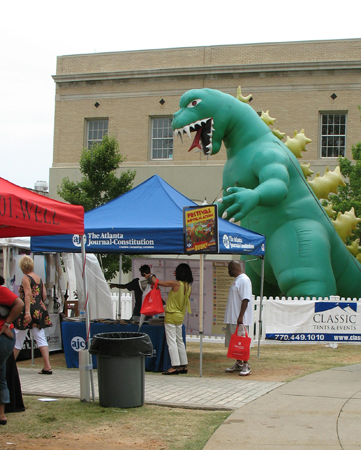
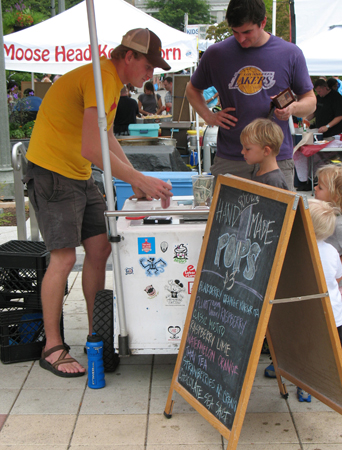
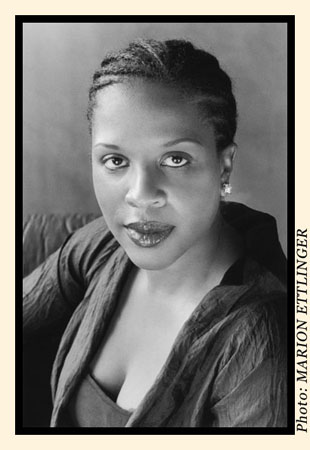
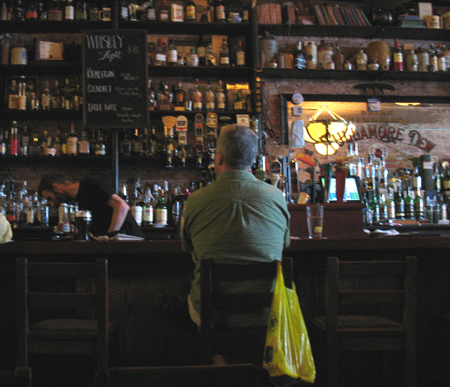
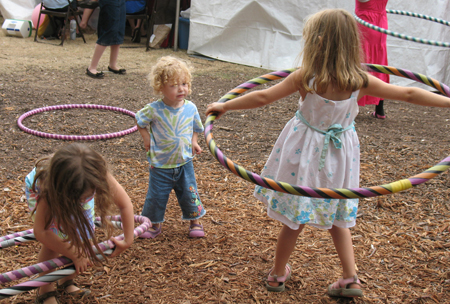
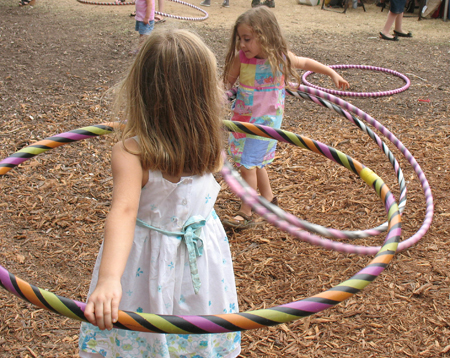

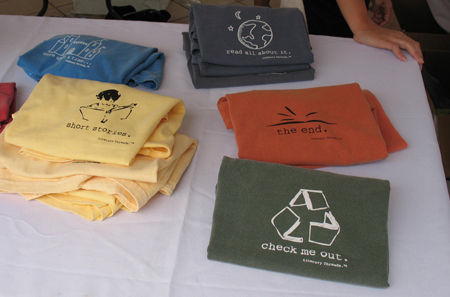
Thanks for the report.